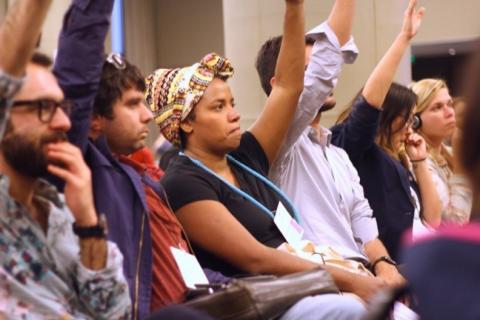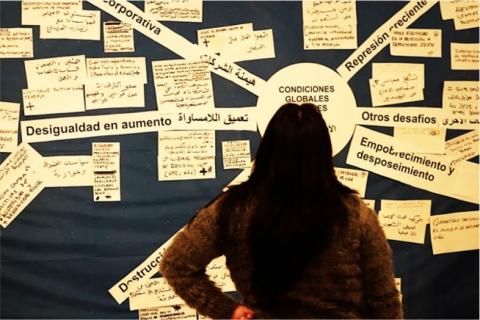
A Common Charter for Collective Struggle
See the Common Charter as an illustrated 2 page flyer (PDF)
The Common Charter for Collective Struggle was affirmed by ESCR-Net Members during their Global Strategy Meeting (15-19 November 2016) as a shared analysis of common conditions deepening inequalities and leading to the impoverishment and dispossession of communities around the world. The Charter provides an overview of the global forces affecting people living in both rural and urban areas in the Global South as well as North. It also contains an emerging vision for forging unity across struggles and concludes with initial points of consensus relating to shared demands for justice that might inform a global campaign or coordinated actions in line with ESCR-Net’s mission “to build a global movement to make human rights and social justice a reality for all.”
The Common Charter was originally developed by the Network’s Working Group of Social Movements and Grassroots Groups. In the 18 months prior to the Global Strategy Meeting, some 20 social movements – Members of ESCR-Net – deepened a shared analysis of common global conditions facing their distinct communities and articulated emerging points of unity among their movements as a foundation for network-wide action and campaigning. Following review of an initial draft by members of ESCR-Net’s thematic working groups in June 2016, and the incorporation of the input offered by those members, the Common Charter for Collective Struggle was presented and discussed at the Global Strategy Meeting, held in Buenos Aires Argentina, in order to contribute to the analysis informing the Network’s forthcoming strategic plan.
ESCR-Net core principles include ensuring “the centrality of grassroots groups and social movements; grounding network activities in the lived experience of people resisting ESCR violations; and advancing concrete, collective actions able to affect systemic change.” The Common Charter reflects an important moment of social movement leadership within ESCR-Net, facilitating points of network-wide shared analysis grounded in the experiences of people confronting human rights violations and pushing our collective action to transform unjust economic and political structures.
Common Conditions and Shared Challenges
The Charter outlines some of the key characteristics of the dominant economic, social and political models that undermine the realization of human rights. These include impoverishment and dispossession amid abundance, corporate capture of government institutions and decision-making, deepening inequality, the degradation of ecosystems and climate change, and growing repression against human rights defenders.
Emerging Points for Unity Across Struggles
Members of ESCR-Net's Social Movement Working Group have argued that “another world is possible, and necessary, and we are the vehicle to get there.” In part, this requires a recognition that the diverse members of ESCR-Net are all facing common global forces and interests that stand to benefit from the impoverishment and dispossession of others. The movements agreed that we must globalize the struggle for the rights of the poor, marginalized and dispossessed based on the following points. These begin with reclaiming human rights as a common framework for analysis and demands emerging from social struggle, which promotes accountability and challenges the model of development and governance which perpetuates abuses.
ESCR-Net members also share a commitment to connecting struggles to create a global, united movement to confront social, economy and environmental injustice, inequality, dispossession and exploitation. Specific points of connection between diverse struggles and advocacy efforts would include a commitment to confronting corporate capture of state institutions and decision-making processes, an insistence on the non-negotiable, universal, interdependent and indivisible nature of human rights, as binding obligations, rather than voluntary goals. They also generally suggest a need to question the morality of a relentless drive for profit amid deepening inequality and efforts to criminalize and silence human rights defense.
A commitment to foregrounding the leadership of people and communities who have been impoverished, dispossessed and marginalized by the same system that privileges profit over basic human dignity is another point that unifies diverse efforts to advance social change. Finally, the need to go beyond a denunciation of injustice to articulate alternative models based on human rights would likely entail the affirmation of human dignity, a demand for substantive equality, the need to safeguard space for dissent and “the right to claim rights.” In this vision of a common future articulated by ESCR-Net’s members, there exists scarce space for the drivers of poverty, dispossession, inequality and environmental destruction currently taking place around the world.
Download the Common Charter for Collective Struggle here. The Charter is also available in Spanish, French and Arabic.

